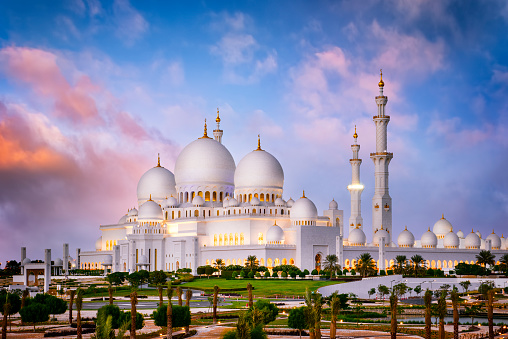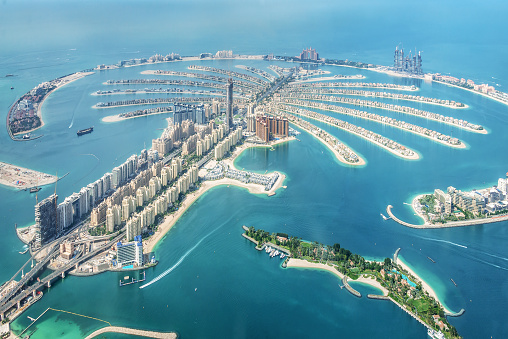Last updated on June 23rd, 2022
UAE in Ancient Times
1. First Humans Out of Africa
In 2019, archaeologists found artifacts that were 125,000 years old in the Sharjah region of the United Arab Emirates. This is the oldest collection of scraping tools and hand axes discovered outside of Africa, suggesting that humans began moving out of the continent much earlier than previously thought.
2. Oldest Natural Pearl
The world’s oldest natural pearl was uncovered at UAE’s Marawah Island. Radiocarbon dates it back to 5800-5600 BC when people used pearls for adornment. Experts think that the pearls were traded with ancient Mesopotamia for ceramics and other goods.
3. Hajar Mountain Copper
Contact with other nearby civilizations was also motivated by copper trade with rich deposits in the Hajar Mountains, a range that spans from UAE to Oman. The highest point in the country is on its north-western side called Jebel Jais at 1,892 m.
4. Saruq Al Hadid
In 2002, the ruler of Dubai noticed an unusual pattern in the sand dunes while flying by helicopter. Scientists found that the site was filled with stones that were by-products of large-scale metal production during the Iron Age.
5. Sophisticated Weapons
From 2,000 to 1,300 BCE, the Wadi Suq people populated UAE. They produced sophisticated weaponry with long swords, bows, and arrows that archaeologists found in the tombs. Many of these were cast in bronze.
6. Battle of Dibba
After the death of The Prophet Muhammad (pbuh), insurrections against Muslim leaders erupted south of the Persian Gulf. Ten thousand people died in the Battle of Dibba, in modern-day UAE, where graves can still be seen.

7. Ancient Tomb
In 2004, a resident of Dibba al Hisn found a piece of ancient pottery in his garden. The government bought his house and started digging. They uncovered a large ancient tomb, a pre-Islamic settlement, and artifacts from the Roman empire.
8. Sharjah Finds
In 2015, a team from the University of Kanazawa in Japan dug around the UAE east coast and found ceramic evidence of major trade that extends all the way to China.
9. Medieval Trade City
In 2010, archaeologists found the ancient city of Julfar that was famous for its trade with Asia and Europe. Early records suggest that this was one of the most prosperous areas in the world. The discovery was just in time before a desalination plant was built over the site.
10. Ancient Christian Site
In the early 1990s, a church and monastery that has been buried for centuries was uncovered in Sir Bani Yas Island. This shows that Christianity was present in the region as early as the 7th century CE.
UAE on map
UAE Under Imperialist Rule
11. Portuguese Conquest
In the 16th century, the Portuguese led by Alfonso de Albuquerque launched a bloody conquest of the coastal areas around Oman and the UAE. Among the hardest hit were Muscat, Sohar, and Khor Fakkan on the eastern coast.
12. British Expeditions
The British sail across the Persian Gulf to reach their colonies in India. Due to rampant piracy, they launched military campaigns in the early 1800s that forced local rulers into a truce. This treaty made the region a British protectorate until the 1970s.
13. Discovery of Oil in the Trucial States
British oil companies began looking for oil deposits in the region after successful ventures in Persia and Mesopotamia at the onset of the 1900s. The first commercial discovery was in 1958 at the Upper Thamama rock formation.
14. Legendary Marine Explorer
One of the undersea surveys for oil were led by Jacques Cousteau, the famous marine explorer, French naval officer, and filmmaker. Cousteau’s documentary about his underwater discoveries won the 1956 Cannes Film Festival’s Palme d’Or.

15. Floating Platform Rig
To make offshore drilling possible, the oil companies built a 4,000-ton floating platform rig called The Enterprise. It was designed by Americans and made by German workers using British equipment. The rig is 60m long and 30m wide with four retractable 50m legs.
Independent UAE
16. Loss of British Protection
By the late 1960s, the British Navy was overstretched and under-equipped. Prime Minister Harold Wilson announced that the government will no longer provide protection for the region. Neighboring countries didn’t waste time launching invasions.
17. Formation of the UAE
Understanding the need for unity in the face of outside threats, seven of the formerly separate sheikhdoms joined forces to create the United Arab Emirates. Others such as Bahrain and Qatar became independent states in 1971.
18. The UAE Flag

The 1916 Arab Revolt flag features four colors (black, white, green, and red) that symbolize Arab identity and history. The United Arab Emirates, as well as Kuwait, Jordan, and Palestine, used this as the inspiration for their own flags.
19. Military Defense
The UAE has a small yet modern military for protection. It also signed military agreements with the US and France in the mid-1990s. France was allowed to set up a military base within Abu Dhabi in 2008.
20. First Arab Country to Mars
The Hope orbiter launched on July 19, 2020 and successfully reached Mar’s orbit on February 9, 2021. UAE is the first Arab country to achieve this feat and only the fifth in the world to do so. The orbiter will study the planet’s atmosphere.
Economy
21. Air Transport
In 2014, the Dubai International Airport overtook London Heathrow as the busiest airport in the world when measuring international passenger traffic.

22. Most Passengers in the World
All airlines had a hard time in 2020 but Dubai-based Emirates managed to carry more passengers than anyone else in the world. The total reached 15.8 million according to the IATA World Air Transport Statistics.
23. Pearl Trade in the Gulf
Before the oil boom, pearl trade was the main economic driver across the gulf coast. However, the industry collapsed in the 1900s due to the development of cultured pearl and the Great Depression.
24. The Pearl Route
Much of UAE’s pearls were shipped to Mumbai which was the largest market in the world. However, India drastically increased taxes on pearl imports after its independence which contributed to pearling decline.
25. Oil and Gas
The discovery of fossil fuels enabled UAE to transform from a rustic coastal area to a modern highly urbanized society. Wary of overdependence, the country diversified its economy such that oil and gas contributed only 26% to GDP by 2018.
26. Barakah Nuclear Power Plant
The Barakah nuclear power plant is the first of its kind in the Arabian Peninsula. Construction began in 2012 to diversify energy sources. Once fully operational, it will produce 25% of the country’s energy needs.
27. Ease of Doing Business
The World Bank studies the business environment around the globe and releases the rankings each year. In 2020, the UAE was listed as No. 16 in the world. It is a big jump from its No. 26 ranking in 2017. Factors that help include a stable government, good infrastructure, improving regulatory environment, and low taxes.
28. Tourism in UAE
In 2019, Dubai opened its doors to 16.73 million visitors which is a 5.1% increase from the previous year. The industry contributed 11.5% of the GDP. The government continues to invest heavily in tourism.

29. World’s Tallest Building
The Burj Khalifa is a major tourist draw and a symbol of the country’s wealth. Standing at 828 meters, it is the tallest freestanding structure in the world. Within the building is the world’s highest nightclub and restaurant, as well as the longest elevator.
30. 5G or F-35
In 2019, the UAE announced that Huawei would help it roll out 5G across the country. The US, a key ally, objected to this deal over security concerns about the company.
Culture
31. Emirati Breakfast
Emirati breakfast often features bread such as chabab pancake, khameer flat bread, and reqaq thin bread. They also serve dango boil chickpeas, baleetat sweet omelet, and shaksuka scrambled eggs.
32. Traditional Lunch
Traditional UAE lunch includes hareeth (wheat porridge with meat), samak mashwi (grilled fish), thereed (meat stew), machboos (flavored rice with meat toppings), and lamb ouzi (spiced rice with lamb meat and almonds).

33. Popular Desserts
Popular desserts are the luqaimat (sweet fried dumplings in date syrup), aseeda (pumpkin pudding with cardamom and nuts), and al batheetha (baked treat with dates and spices).
34. Camels as Utilitarian Animals
Camels are important sources of meat and milk. These also served as the primary mode of transport across the desert before the advent of motorized vehicles. Camel wool is used for clothes, rugs, and tents.
35. Camel Beauty Contests
Camel breeders compete in beauty contests for their prized animals. Only females are allowed because male camels are deemed too violent. Ideal characteristics include a graceful posture, long neck, droopy lips, large hooves, and broad cheeks.

36. Coffee Traditions
Coffee is used to welcome guests. It is served using a long-spouted jug with saffron and cardamom. It is often paired with nuts, dried fruits, and dates. Hosts serve the elders first.
37. Probiotic Beverage
UAE residents love drinking cold laban to quench their thirst due to hot weather. It is considered as a healthy option due to its probiotic content after milk fermentation.
38. Alcohol Consumption
To boost the economy and increase tolerance, UAE relaxed its alcohol restrictions in 2020. There are no more penalties for consumption and possession for people aged 21 and older. Before the change, individuals had to get a license just to purchase.
. . . continue reading on the next page
